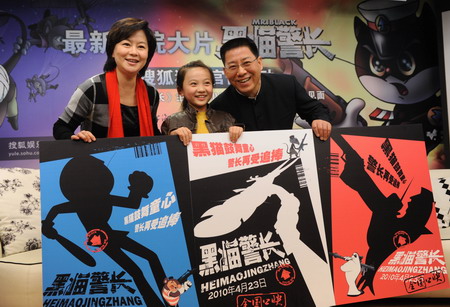
An all-star dubbing cast - Ju Ping, Lin Miaoke and Li Yang (left to right) - attend a promotional event on March 17 in Beijing for Mr Black, an animated film based on a domestic cartoon that was popular in China more than 20 years ago. (Photo: Zhang Wei / for China Daily)
BEIJING, July 12 (Xinhuanet) -- China is opposed to importing a large number of foreign cartoons because the move would hinder its domestic animation industry, said a senior official with the country's top TV and film watchdog.
The purpose of introducing foreign cartoons is to learn from their strengths, such as creativity and technique, said Jin Delong, director of the publicity and administration department of the State Administration of Radio, Film and Television (SARFT). But importing too many will hamper the development of Chinese animation, he said.
Jin made the remarks at the China Animation Market, a forum for animators, producers, distributors, broadcasters and investors, which ended on Sunday in Jiangsu province's Suzhou city, China News Service reported.
China produced many animated films prior to the 1980s. Many of them, such as The Monkey King and Secrets of the Heavenly Book, which were based on Chinese legends, are still considered masterpieces.
The first foreign cartoon introduced to China was Japan's Astro Boy series, which arrived in the country in 1981. Foreign animations have since flooded into China, gradually dominating the market due to more entertaining storylines.
Jin said the Chinese cartoon industry produced 2,860 hours of animation in 2009, about 40 times more than the annual average of 70 hours from 1993 to 2003.
The remarkable growth has largely resulted from government policies adopted in 2004 to support domestic production, he said.
SARFT issued a circular that year, requiring at least 60 percent of cartoons broadcast on TV to have been domestically produced. It banned foreign animations from being shown from 5 pm to 8 pm in 2006 and extended the broadcasting time to 9 pm in 2008.
The government has also annually invested 200 million yuan ($29.5 million) in the cartoon industry since 2006.
Last July, the Ministry of Finance and the State Administration of Taxation adopted a favorable tax policy to support the growth of the comics and animation industry.
"All of the measures have started to pay off," Jin said.
Lu Shengzhang, a professor at the school of animation, the Communication University of China, said an extreme lack of high-quality cartoons is the main problem facing China's animation industry.
"Even Pleasant Goat and Big Big Wolf, one of the most popular Chinese animated movies, still needed to improve its image design and language," he said.
Japan, which is famous for the quality of its animation, produces an annual average of 1,333 hours of cartoons, many of which are among the world's most influential, Lu said.
Many countries have protective policies for their cartoon industry. South Korea requires the names of all characters in Japanese animations to be changed into Korean names when imported.
But, Lu added, protectionism cannot provide sustainable solutions. "Focusing more on producing higher quality animations is essential to their future development," he said.
(Source: China Daily)
